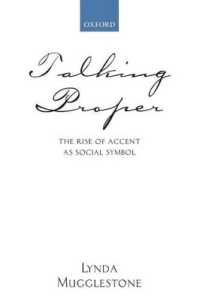基本説明
The crime of genocide has remained absent from French courtrooms and this book dissects the reasons for this absence, reviewing and analysing the potential legal obstacles to the judicial use of the law of genocide.
Full Description
This book explores the ambiguities of the French law of genocide by exposing the inexplicable dichotomy between a progressive theory and an overly conservative practice. Based on the observation that the crime of genocide has remained absent from French courtrooms to the benefit of crimes against humanity, this research dissects the reasons for this absence, reviewing and analysing the potential legal obstacles to the judicial use of the law of genocide before contemplating the definitional impact of this judicial reluctance and the consequent confusion between the two crimes. Whilst it uses the French law of genocide and related case law on crimes against humanity as its focal points, the book further adopts a more general standpoint, suggesting that the French misunderstandings of the crime of genocide might ultimately be symptomatic of a more widespread misconception of the crime of genocide as a crime perpetrated against 'a group'.
Contents
Introduction
Part 1 Crimes Against Humanity: From Nuremberg to Lyon . . . And Back Again
1 Trying Klaus Barbie: Setting a Precedent?
1.1 Crimes Against Humanity and the Victimisation of the Individual
1.2 Systematic Crimes 'in the Name of a State Practising a Policy of Ideological Supremacy'
1.3 Perceiving the Knowledge Requirement
2 Trying Paul Touvier and Maurice Papon: Twisting the Precedent
3 A Problematic Legacy
3.1 Equalising Victims, Confusing Crimes
3.2 Making of Nuremberg a Law of Circumstances
Part 2 Punishing Genocide: Too Much To Ask?
4 The Direct Applicability of the Genocide Convention under French Law
5 The Non-Applicability of Statutory Limitations to the Crime of Genocide
6 The Applicability of Retroactive Criminal Norms
7 The Contemporary Understanding of the Law of Genocide by the French Judiciary: Dualism in Disguise?
8 Concluding Observations
Part 3 Why Genocide?
9 Responding to the Incorrect Ill-Qualification of Vichy France in the Touvier and Papon cases
9.1 The Laws of Vichy France: 'An Impeccable Style for an Infinite Horror'
9.2 The Criminal Acts of Vichy France: The Question of Genocidal Intent
9.3 The Criminality of Vichy France: Complicity in Genocide
10 Responding to the Equalisation of Victims in the Barbie Case
11 Genocide: A Crime Against the Family?
11.1 The Legal Destruction of the Family
11.2 The Physical Destruction of the Family
12 Conclusion




